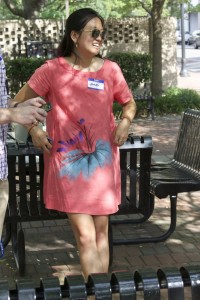Interview conducted by Ayana Sadler, CEF Summer Intern
Anne Yeung was a one-year Community Engagement Fellow working full-time out of the CEF Durham Office, helping foster CEF’s relationship with the Duke Office of Durham and Regional Affairs, building CEF programs, and supporting volunteer advocates. She chose to work with CEF because she was seeking a professional experience that ethically and impactfully addressed systemic problems in the community.
How long have you been with CEF?
I’ve been with CEF for about three years now — two years as a volunteer while I was at Duke and this past year working as full-time staff.
What did you study at Duke?
I graduated from Duke in 2014. I was a public policy major, pre-med, with an interest in public health and social medicine.
What are your job responsibilities with CEF?
I work full-time as the Durham Program Coordinator. I would say the work is like three “buckets,” though they aren’t really buckets because they all kind of work together. The three categories are advocate support — supporting our wonderful student volunteers to do both the direct service work that they do and the administrative back end support they do to make CEF run; community partnerships — being out in the community and talking to other partners out in the area and getting CEF’s name out there and figuring out how we can best work together to support our members; and then the third category is program development — putting the previous two things together and thinking about, what do our programs need to be, where do they need to be to best support our members. How do we improve them? How do we grow them?
How has your position evolved since you first started?
I would say that the biggest difference about my position is that I really don’t support students as much anymore. The reason is that they’re all supporting themselves, they’re all supporting each other. And, they have grown tremendously our capacity for leadership and the structure where people have their purview of responsibility and decision-making, then take it and run with it. So, I kind of find myself sitting back and watching a lot more, which is really awesome.
What are some challenges you faced while working for CEF?
The biggest challenges are probably moments of helplessness. We all live within these systems and we are subject to the faults and failures of these systems; so, despite people’s incredible resilience and resourcefulness and creativity, sometimes you just bump up against the system and there’s not much you can do about it. Whether it’s lack of affordable housing or the way our criminal justice system works or something else…just moments where you are just one person and no matter how amazing you are as a person, you are just one little person in this giant system and that can feel very helpless and really hard.
What is your most memorable moment with CEF?
My most memorable moment with CEF is the first time we had “House Course,” which is our Duke for-credit, semester-long, academic course that is our training for all of our advocates in Durham. That was fall 2014, and it was the end of the semester and we were doing reflections, so everyone was going around talking about some high or low that they had or a memorable moment during the semester, working with a member, or during Office Hours. And, I felt like I heard 30 times what had happened for me, and I was watching it happen for 30 other member-advocate pairs. That was just astounding and so awesome, and I almost cried — I didn’t cry, but I almost cried — because I think the coming together of two people and the magic that can happen there where you learn about yourself and you learn about somebody else’s story and where you help each other in different ways is really beautiful. And I will never forget that moment.
How has CEF inspired you? Either a member, advocate, peer, co-worker, etc.
This is a hard one because there’s a lot you could say. There’s two things I would say. I’m inspired by people’s enormous capacity for growth: just watching someone be over here, and then a semester later, or a year later, or even a few weeks later be totally over there, and just have changed fundamental parts of themselves. And I think the second thing that really ties into that is people’s commitment to wanting to learn and grow continuously, and to always evolve and not be complacent about where you are. I’ve seen that in our members, our advocates, staff around me — that has definitely been really inspirational.
What’s next for you?
I’ll be going to Georgetown School of Medicine in August. Actually, my first day of classes is August 10th. I’ll be going into medicine, and I hope to practice for some of my time and spend the rest of my time leveraging the direct physician caretaker perspective to work on more of a systems level.
I don’t know if that will mean working for a non-profit, or working in medical academia, or working as medical director of a state health department, or something like that. I’m not sure yet, but I look forward to it whatever it is. And, one thing that CEF has taught me is that life can change dramatically in a very short amount of time; so, that’s my answer for now, but who knows?




No comments yet.